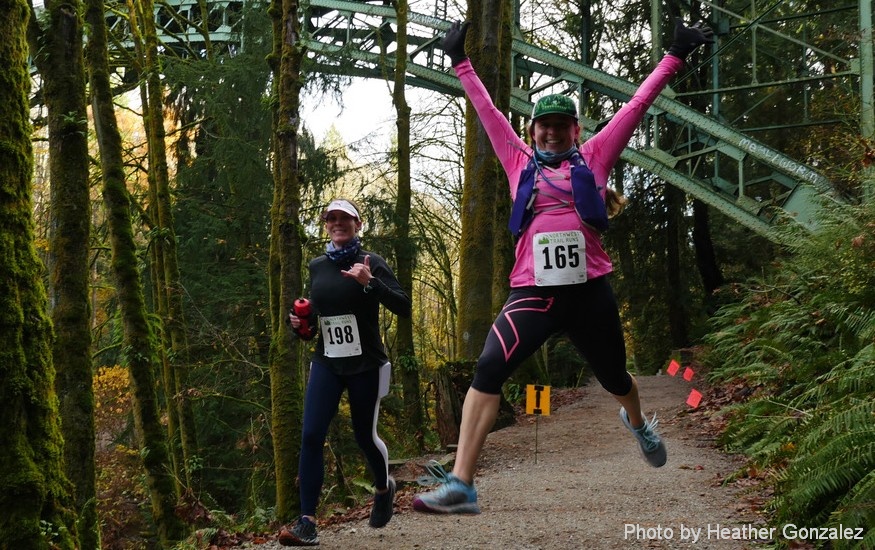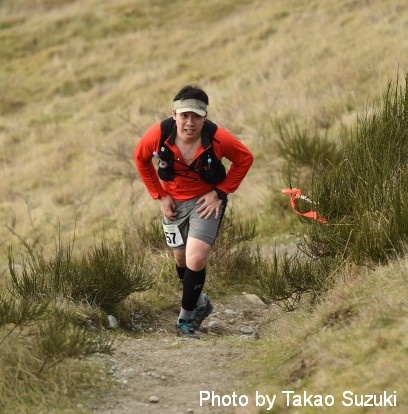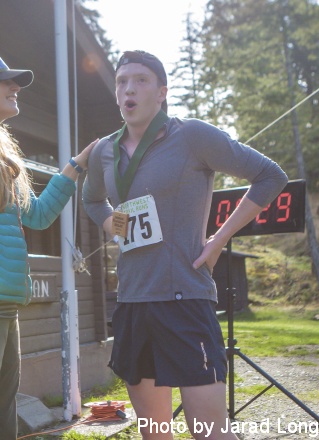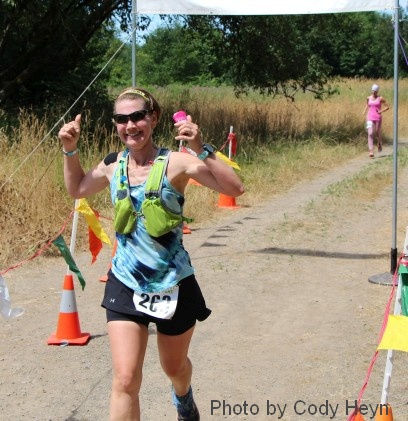by Dr Shannon O’Grady
“The key to a strong finish is a strong start.”
Shannon O’Grady has a Ph.D. focused in Nutritional Physiology from the University of Utah and is the Chief Product Officer and Chief Operating Officer of Gnarly, which is a sports nutrition sponsor of Northwest Trail Runs.
Pre-Run Nutrition
There is a lot of speculation regarding proper race day hydration and fueling, and in truth, the optimal strategy for you is likely to be quite different than the runner next to you. Given that, there are some basic hydration and fueling strategies, that if you’re not already doing, will definitely help on race day.
Hydration and fluid
No matter the distance, being properly hydrated at the starting line is integral to a successful race; aim to take in 16-24 oz of fluid, ideally an electrolyte drink, 2-3 hours before your race. Your body generally stores enough energy, in the form of glycogen, to keep you fueled for runs up to 90 minutes, so if you plan on being out for less than 90 minutes you may not need to consume extra calories. Gnarly Hydrate is available on course at all Northwest Trail Runs events. Now you can train with Gnarly Hydrate and get a 15% discount today by using the code, RUN4Ever
Mid-Run Nutrition
As you gradually build to match the distance of your race, you should also train for how to fuel and hydrate your body during that distance.
If your training run or race is under 60 minutes and you fuel and hydrate properly beforehand, you will not necessarily need to take in any more calories or fluid while you’re running. If you are training for a longer effort, like a half marathon however, it will be key to use your longer training runs to practice consistent fueling and hydration. Additionally, it’s always a good idea to know what food and hydration products will be offered at aid stations on the course and, if possible, train with those products; this information is usually available on race websites.
PRO TIP: During your longer training runs, get on a consistent fueling schedule by setting your watch timer for 20-30 minute intervals at which you take in calories and hydrate; you can either use this same strategy during your race or just plan on stopping at regularly spaced aid stations. Practicing race day nutrition during your training will also allow you to fine tune the amount and type of calories your body can handle while running. You should generally aim on consuming 120-240 calories (30-60g of carbs) per hour of running.
In addition to figuring out how much to eat, figuring out how much to drink is also something to work on in advance of your race. Essentially, the goal is to replace what is lost through sweat, so run hydration should be about both fluid and electrolyte replacement. A good first step, and something you can do at home, is to determine your sweat rate or the amount of water lost via sweat in a given amount of time (typically an hour). For the specifics on how to effectively do a sweat test, visit this page. When measuring sweat rate, it’s important to replicate the conditions you will experience on race day as closely as possible.
Taking in the right amount of water will get you halfway to properly hydrating, but if that is all you do, then your performance will suffer and you could seriously injure yourself. The other half of the equation involves replenishing the electrolytes lost in sweat. Determining the amount of electrolytes lost in sweat requires a sweat test which can be administered and analyzed in performance labs. Much like sweat rate, the electrolyte content of sweat is dependent on many factors and can vary greatly from person to person. Although sodium, potassium, calcium and magnesium are all lost in sweat, sodium is, by far, lost in the greatest concentrations, with losses ranging from 200-700mg per 16 oz of sweat. By choosing a hydration beverage that contains electrolytes at effective levels, you ensure you’re giving your body both the water and electrolytes it needs to perform optimally, while preventing cramping and dehydration.
Post-Run Nutrition
Athletes often get caught up in the distracting excitement and satisfaction of reaching the finish line and consequently often neglect post-race nutrition. Refueling and rehydrating after a race can significantly decrease muscle soreness and reduce recovery time.
To realize these benefits, aim for consuming between 60-80g of carbohydrate and 15-20g of protein within 30-60 minutes of completing your run. Taking in sufficient carbohydrates will replenish glycogen stores, while protein intake will reduce exercise-induced muscle damage, build new muscle and lower levels of the stress hormone cortisol. Timing is everything, so if you don’t have a post-race meal prepared in advance or you’re far away from your kitchen, consider a protein shake added to milk or juice to get the nutrients you need quickly and conveniently. Doing so will also help with fluids lost during your effort. The ultimate rehydration goal, however, should be consuming 16-18 oz of an electrolyte replacement drink within 2 hrs of finishing the run. Gnarly Hydrate is a great choice for your electrolyte replacement drink.
Save 15% on Gnarly Hydrate or Gnarly Protein (Vegan or Whey) NOW with code RUN4Ever
Good nutrition practices lay the groundwork for a healthy body and set the stage for optimal performance. Start experimenting with these basic principles during your training and learn what works best for you. If you haven’t been doing what’s suggested above, don’t sweat it (pun intended), pick a couple of things to work on and you will soon realize the benefits.






